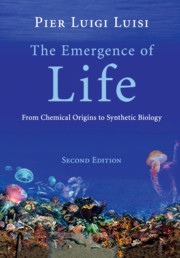Book contents
- Frontmatter
- Contents
- Acknowledgments
- Introduction
- Part I Approaches to the origin of life
- Part II What is life? The bio-logics of cellular life
- Part III Order and organization in biological systems
- Part IV The world of vesicles
- Part V Towards the synthetic biology of minimal cells
- As a way of conclusion
- Appendix The open questions about the origin of life
- References
- Names index
- Subject index
Appendix - The open questions about the origin of life
Published online by Cambridge University Press: 05 September 2016
- Frontmatter
- Contents
- Acknowledgments
- Introduction
- Part I Approaches to the origin of life
- Part II What is life? The bio-logics of cellular life
- Part III Order and organization in biological systems
- Part IV The world of vesicles
- Part V Towards the synthetic biology of minimal cells
- As a way of conclusion
- Appendix The open questions about the origin of life
- References
- Names index
- Subject index
Summary
We have discussed – throughout the book – some ideas for research projects that are not commonly present in the literature of today. This is, of course, only a small specimen of the questions we may still ask, and which have not been asked sufficiently, about the origin of life. Actually, the questioning on the questions which are not being asked, has been in my agenda for a long time, and at a certain point I decided to formalize this by instituting international meetings with the title Open Questions about the Origin of Life (OQOL). While the aim of the normal meetings on the origin of life was to shed light on the new findings in the field, such OQOL meetings would instead have been devoted to the shadow aspects, in the sense to bring forth the questions which, for one reason or another, are usually not asked. In turn, this “not being asked” is per sé an interesting matter, as it is connected to the Zeitgeist, to the dominating philosophy and way of thinking in this particular area of scientific inquiry. I have already mentioned, maybe too many times, that the DNA-centered reductionist view is the one which mostly pervades the area in this “century of the gene.” In addition to that, there are in my opinion questions which are too difficult to tackle, both conceptually and experimentally – for example, the biogenesis of ordered macromolecular sequences, the origin of the kinetic control, or even the origin of the genetic code – and that therefore are almost never found in the titles of papers on the origin of life. Another point is that we scientists keep thinking along the same – our own – research lines for decades, we do not like to change. Several reasons, then, why one should make an effort to think at the OQOL.
The first of these meetings took place in Erice, Sicily, in 2006, where I had the collaboration of Pasquale Stano; the second one in San Sebastian, Spain, 2009, with Kepa Ruiz Mirazo; the third one in 2011 in Leicester, with the collaboration of Rainer Derek, and the last one in 2014 as a workshop of the International Congress on the Origin of Life in Nara, Japan with the collaboration of Yutetsu Kuruma.
- Type
- Chapter
- Information
- The Emergence of LifeFrom Chemical Origins to Synthetic Biology, pp. 404 - 418Publisher: Cambridge University PressPrint publication year: 2016



